- Home
- P. G. Wodehouse
Very Good, Jeeves Page 3
Very Good, Jeeves Read online
Page 3
‘Be careful!’ yipped the Right Hon.
I was.
Whoever built the Octagon might have constructed it especially for this sort of crisis. Its walls had grooves at regular intervals which were just right for the hands and feet, and it wasn’t very long before I was parked up on the roof beside the Right Hon., gazing down at one of the largest and shortest-tempered swans I had ever seen. It was standing below, stretching up a neck like a hosepipe, just where a bit of brick, judiciously bunged, would catch it amidships.
I bunged the brick and scored a bull’s-eye.
The Right Hon. didn’t seem any too well pleased.
‘Don’t tease it!’ he said.
‘It teased me,’ I said.
The swan extended another eight feet of neck and gave an imitation of steam escaping from a leaky pipe. The rain continued to lash down with what you might call indescribable fury, and I was sorry that in the agitation inseparable from shinning up a stone wall at practically a second’s notice I had dropped the raincoat which I had been bringing with me for my fellow-rooster. For a moment I thought of offering him mine, but wiser counsels prevailed.
‘How near did it come to getting you?’ I asked.
‘Within an ace,’ replied my companion, gazing down with a look of marked dislike. ‘I had to make a very rapid spring.’
The Right Hon. was a tubby little chap who looked as if he had been poured into his clothes and had forgotten to say ‘When!’ and the picture he conjured up, if you know what I mean, was rather pleasing.
‘It is no laughing matter,’ he said, shifting the look of dislike to me.
‘Sorry.’
‘I might have been seriously injured.’
‘Would you consider bunging another brick at the bird?’
‘Do nothing of the sort. It will only annoy him.’
‘Well, why not annoy him? He hasn’t shown such a dashed lot of consideration for our feelings.’
The Right Hon. now turned to another aspect of the matter.
‘I cannot understand how my boat, which I fastened securely to the stump of a willow-tree, can have drifted away.’
‘Dashed mysterious.’
‘I begin to suspect that it was deliberately set loose by some mischievous person.’
‘Oh, I say, no, hardly likely, that. You’d have seen them doing it.’
‘No, Mr Wooster. For the bushes form an effective screen. Moreover, rendered drowsy by the unusual warmth of the afternoon, I dozed off for some little time almost immediately I reached the island.’
This wasn’t the sort of thing I wanted his mind dwelling on, so I changed the subject.
‘Wet, isn’t it, what?’ I said.
‘I had already observed it,’ said the Right Hon. in one of those nasty, bitter voices. ‘I thank you, however, for drawing the matter to my attention.’
Chit-chat about the weather hadn’t gone with much of a bang, I perceived. I had a shot at Bird Life in the Home Counties.
‘Have you ever noticed,’ I said, ‘how a swan’s eyebrows sort of meet in the middle?’
‘I have had every opportunity of observing all that there is to observe about swans.’
‘Gives them a sort of peevish look, what?’
‘The look to which you allude has not escaped me.’
‘Rummy,’ I said, rather warming to my subject, ‘how bad an effect family life has on a swan’s disposition.’
‘I wish you would select some other topic of conversation than swans.’
‘No, but, really, it’s rather interesting. I mean to say, our old pal down there is probably a perfect ray of sunshine in normal circumstances. Quite the domestic pet, don’t you know. But purely and simply because the little woman happens to be nesting—’
I paused. You will scarcely believe me, but until this moment, what with all the recent bustle and activity, I had clean forgotten that, while we were treed up on the roof like this, there lurked all the time in the background one whose giant brain, if notified of the emergency and requested to flock round, would probably be able to think up half-a-dozen schemes for solving our little difficulties in a couple of minutes.
‘Jeeves!’ I shouted.
‘Sir?’ came a faint respectful voice from the great open spaces.
‘My man,’ I explained to the Right Hon. ‘A fellow of infinite resource and sagacity. He’ll have us out of this in a minute. Jeeves!’
‘Sir?’
‘I’m sitting on the roof.’
‘Very good, sir.’
‘Don’t say “Very good”. Come and help us. Mr Filmer and I are treed, Jeeves.’
‘Very good, sir.’
‘Don’t keep saying “Very good”. It’s nothing of the kind. The place is alive with swans.’
‘I will attend to the matter immediately, sir.’
I turned to the Right Hon. I even went so far as to pat him on the back. It was like slapping a wet sponge.
‘All is well,’ I said. ‘Jeeves is coming.’
‘What can he do?’
I frowned a trifle. The man’s tone had been peevish, and I didn’t like it.
‘That,’ I replied with a touch of stiffness, ‘we cannot say until we see him in action. He may pursue one course, or he may pursue another. But on one thing you can rely with the utmost confidence – Jeeves will find a way. See, here he comes stealing through the undergrowth, his face shining with the light of pure intelligence. There are no limits to Jeeves’s brain-power. He virtually lives on fish.’
I bent over the edge and peered into the abyss.
‘Look out for the swan, Jeeves.’
‘I have the bird under close observation, sir.’
The swan had been uncoiling a further supply of neck in our direction; but now he whipped round. The sound of a voice speaking in his rear seemed to affect him powerfully. He subjected Jeeves to a short, keen scrutiny; and then, taking in some breath for hissing purposes, gave a sort of jump and charged ahead.
‘Look out, Jeeves!’
‘Very good, sir.’
Well, I could have told that swan it was no use. As swans go, he may have been well up in the ranks of the intelligentsia; but, when it came to pitting his brains against Jeeves, he was simply wasting his time. He might just as well have gone home at once.
Every young man starting life ought to know how to cope with an angry swan, so I will briefly relate the proper procedure. You begin by picking up the raincoat which somebody has dropped; and then, judging the distance to a nicety, you simply shove the raincoat over the bird’s head; and, taking the boat-hook which you have prudently brought with you, you insert it underneath the swan and heave. The swan goes into a bush and starts trying to unscramble itself; and you saunter back to your boat, taking with you any friends who may happen at the moment to be sitting on roofs in the vicinity. That was Jeeves’s method, and I cannot see how it could have been improved upon.
The Right Hon. showing a turn of speed of which I would not have believed him capable, we were in the boat in considerably under two ticks.
‘You behaved very intelligently, my man,’ said the Right Hon. as we pushed away from the shore.
‘I endeavour to give satisfaction, sir.’
The Right Hon. appeared to have said his say for the time being. From that moment he seemed to sort of huddle up and meditate. Dashed absorbed he was. Even when I caught a crab and shot about a pint of water down his neck he didn’t seem to notice it.
It was only when we were landing that he came to life again.
‘Mr Wooster.’
‘Oh, ah?’
‘I have been thinking of that matter of which I spoke to you some time back – the problem of how my boat can have got adrift.’
I didn’t like this.
‘The dickens of a problem,’ I said. ‘Better not bother about it any more. You’ll never solve it.’
‘On the contrary, I have arrived at a solution, and one which I think is the only feasible solution
. I am convinced that my boat was set adrift by the boy Thomas, my hostess’s son.’
‘Oh, I say, no! Why?’
‘He had a grudge against me. And it is the sort of thing only a boy, or one who is practically an imbecile, would have thought of doing.’
He legged it for the house; and I turned to Jeeves, aghast. Yes, you might say aghast.
‘You heard, Jeeves?’
‘Yes, sir.’
‘What’s to be done?’
‘Perhaps Mr Filmer, on thinking the matter over, will decide that his suspicions are unjust.’
‘But they aren’t unjust.’
‘No, sir.’
‘Then what’s to be done?’
‘I could not say, sir.’
I pushed off rather smartly to the house and reported to Aunt Agatha that the Right Hon. had been salved; and then I toddled upstairs to have a hot bath, being considerably soaked from stem to stern as the result of my rambles. While I was enjoying the grateful warmth, a knock came at the door.
It was Purvis, Aunt Agatha’s butler.
‘Mrs Gregson desires me to say, sir, that she would be glad to see you as soon as you are ready.’
‘But she has seen me.’
‘I gather that she wishes to see you again, sir.’
‘Oh, right-ho.’
I lay beneath the surface for another few minutes; then, having dried the frame, went along the corridor to my room. Jeeves was there, fiddling about with underclothing.
‘Oh, Jeeves,’ I said, ‘I’ve just been thinking. Oughtn’t somebody to go and give Mr Filmer a spot of quinine or something? Errand of mercy, what?’
‘I have already done so, sir.’
‘Good. I wouldn’t say I like the man frightfully, but I don’t want him to get a cold in the head.’ I shoved on a sock. ‘Jeeves,’ I said, ‘I suppose you know that we’ve got to think of something pretty quick? I mean to say, you realize the position? Mr Filmer suspects young Thomas of doing exactly what he did do, and if he brings home the charge Aunt Agatha will undoubtedly fire Mr Little, and then Mrs Little will find out what Mr Little has been up to, and what will be the upshot and outcome, Jeeves? I will tell you. It will mean that Mrs Little will get the goods on Mr Little to an extent to which, though only a bachelor myself, I should say that no wife ought to get the goods on her husband if the proper give and take of married life – what you might call the essential balance, as it were – is to be preserved. Women bring these things up, Jeeves. They do not forget and forgive.’
‘Very true, sir.’
‘Then how about it?’
‘I have already attended to the matter, sir.’
‘You have?’
‘Yes, sir. I had scarcely left you when the solution of the affair presented itself to me. It was a remark of Mr Filmer’s that gave me the idea.’
‘Jeeves, you’re a marvel!’
‘Thank you very much, sir.’
‘What was the solution?’
‘I conceived the notion of going to Mr Filmer and saying that it was you who had stolen his boat, sir.’
The man flickered before me. I clutched a sock in a feverish grip.
‘Saying – what?’
‘At first Mr Filmer was reluctant to credit my statement. But I pointed out to him that you had certainly known that he was on the island – a fact which he agreed was highly significant. I pointed out, furthermore, that you were a light-hearted young gentleman, sir, who might well do such a thing as a practical joke. I left him quite convinced, and there is now no danger of his attributing the action to Master Thomas.’
I gazed at the blighter spellbound.
‘And that’s what you consider a neat solution?’ I said.
‘Yes, sir. Mr Little will now retain his position as desired.’
‘And what about me?’
‘You are also benefited, sir.’
‘Oh, I am, am I?’
‘Yes, sir. I have ascertained that Mrs Gregson’s motive in inviting you to this house was that she might present you to Mr Filmer with a view to your becoming his private secretary.’
‘What!’
‘Yes, sir. Purvis, the butler, chanced to overhear Mrs Gregson in conversation with Mr Filmer on the matter.’
‘Secretary to that superfatted bore! Jeeves, I could never have survived it.’
‘No, sir. I fancy you would not have found it agreeable. Mr Filmer is scarcely a congenial companion for you. Yet, had Mrs Gregson secured the position for you, you might have found it embarrassing to decline to accept it.’
‘Embarrassing is right!’
‘Yes, sir.’
‘But I say, Jeeves, there’s just one point which you seem to have overlooked. Where exactly do I get off?’
‘Sir?’
‘I mean to say, Aunt Agatha sent word by Purvis just now that she wanted to see me. Probably she’s polishing up her hatchet at this very moment.’
‘It might be the most judicious plan not to meet her, sir.’
‘But how can I help it?’
‘There is a good, stout waterpipe running down the wall immediately outside this window, sir. And I could have the two-seater waiting outside the park gates in twenty minutes.’
I eyed him with reverence.
‘Jeeves,’ I said, ‘you are always right. You couldn’t make it five, could you?’
‘Let us say ten, sir.’
‘Ten it is. Lay out some raiment suitable for travel, and leave the rest to me. Where is this waterpipe of which you speak so highly?’
2 THE INFERIORITY COMPLEX OF OLD SIPPY
I CHECKED THE man with one of my glances. I was astounded and shocked.
‘Not another word, Jeeves,’ I said. ‘You have gone too far. Hats, yes. Socks, yes. Coats, trousers, shirts, ties, and spats, absolutely. On all these things I defer to your judgement. But when it comes to vases, no.’
‘Very good, sir.’
‘You say that this vase is not in harmony with the appointments of the room – whatever that means, if anything. I deny this, Jeeves, in toto. I like this vase. I call it decorative, striking, and, all in all, an exceedingly good fifteen bob’s worth.’
‘Very good, sir.’
‘That’s that, then. If anybody rings up, I shall be closeted during the next hour with Mr Sipperley at the offices of The Mayfair Gazette.’
I beetled off with a fairish amount of restrained hauteur, for I was displeased with the man. On the previous afternoon, while sauntering along the Strand, I had found myself wedged into one of those sort of alcove places where fellows with voices like fog-horns stand all day selling things by auction. And, though I was still vague as to how exactly it had happened, I had somehow become the possessor of a large china vase with crimson dragons on it. And not only dragons, but birds, dogs, snakes, and a thing that looked like a leopard. This menagerie was now stationed on a bracket over the door of my sitting-room.
I liked the thing. It was bright and cheerful. It caught the eye. And that was why, when Jeeves, wincing a bit, had weighed in with some perfectly gratuitous art-criticism, I ticked him off with no little vim. Ne sutor ultra whatever-it-is, I would have said to him, if I’d thought of it. I mean to say, where does a valet get off, censoring vases? Does it fall within his province to knock the young master’s chinaware? Absolutely not, and so I told him.
I was still pretty heartily hipped when I reached the office of The Mayfair Gazette, and it would have been a relief to my feelings to have decanted my troubles on to old Sippy, who, being a very dear old pal of mine, would no doubt have understood and sympathized. But when the office-boy had slipped me through into the inner cubbyhole where the old lad performed his editorial duties, he seemed so preoccupied that I hadn’t the heart.
All these editor blokes, I understand, get pretty careworn after they’ve been at the job for awhile. Six months before, Sippy had been a cheery cove, full of happy laughter; but at that time he was what they call a free-lance, bunging in a short story
here and a set of verses there and generally enjoying himself. Ever since he had become editor of this rag, I had sensed a change, so to speak.
To-day he looked more editorial then ever; so, shelving my own worries for the nonce, I endeavoured to cheer him up by telling him how much I had enjoyed his last issue. As a matter of fact, I hadn’t read it, but we Woosters do not shrink from subterfuge when it is a question of bracing up a buddy.
The treatment was effective. He showed animation and verve.
‘You really liked it?’
‘Red-hot, old thing.’
‘Full of good stuff, eh?’
‘Packed.’
‘That poem – Solitude?’
‘What a gem!’
‘A genuine masterpiece.’
‘Pure tabasco. Who wrote it?’
‘It was signed,’ said Sippy, a little coldly.
‘I keep forgetting names.’
‘It was written,’ said Sippy, ‘by Miss Gwendolen Moon. Have you ever met Miss Moon, Bertie?’
‘Not to my knowledge. Nice girl?’
‘My God!’ said Sippy.
I looked at him keenly. If you ask my Aunt Agatha she will tell you – in fact, she is quite likely to tell you even if you don’t ask her – that I am a vapid and irreflective chump. Barely sentient, was the way she once described me: and I’m not saying that in a broad, general sense she isn’t right. But there is one department of life in which I am Hawkshaw the detective in person. I can recognize Love’s Young Dream more quickly than any other bloke of my weight and age in the Metropolis. So many of my pals have copped it in the past few years that now I can spot it a mile off on a foggy day. Sippy was leaning back in his chair, chewing a piece of indiarubber with a far-off look in his eyes, and I formed my diagnosis instantly.
‘Tell me all, laddie,’ I said.

 Jill the Reckless
Jill the Reckless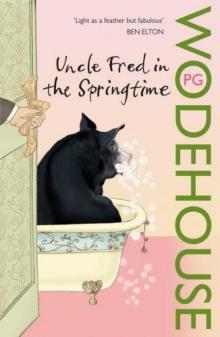 Uncle Fred in the Springtime
Uncle Fred in the Springtime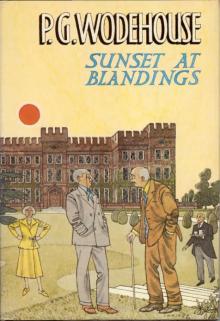 Sunset at Blandings
Sunset at Blandings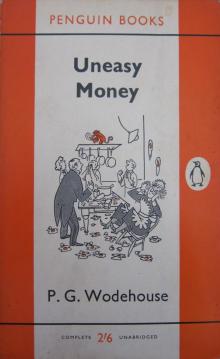 Uneasy Money
Uneasy Money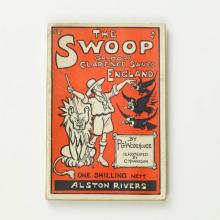 The Swoop! or, How Clarence Saved England: A Tale of the Great Invasion
The Swoop! or, How Clarence Saved England: A Tale of the Great Invasion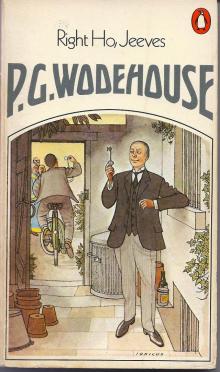 Right Ho, Jeeves
Right Ho, Jeeves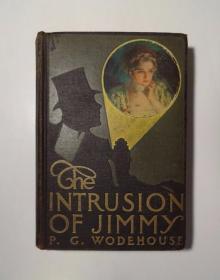 The Intrusion of Jimmy
The Intrusion of Jimmy The Jeeves Omnibus - Vol 1:
The Jeeves Omnibus - Vol 1: Aunts Aren't Gentlemen:
Aunts Aren't Gentlemen: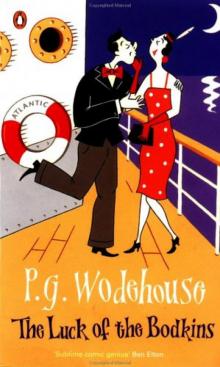 The Luck of the Bodkins
The Luck of the Bodkins The Little Nugget
The Little Nugget Money for Nothing
Money for Nothing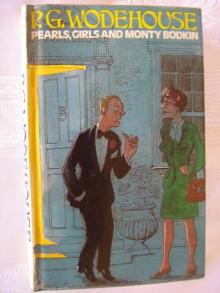 Pearls, Girls and Monty Bodkin
Pearls, Girls and Monty Bodkin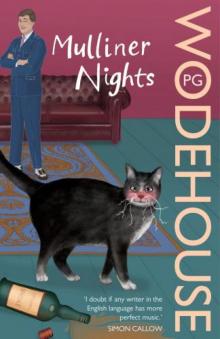 Mulliner Nights
Mulliner Nights Blandings Castle and Elsewhere
Blandings Castle and Elsewhere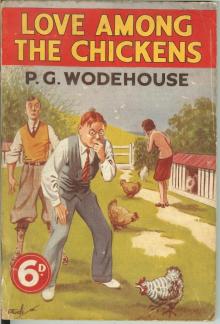 Love Among the Chickens
Love Among the Chickens Carry On, Jeeves!
Carry On, Jeeves!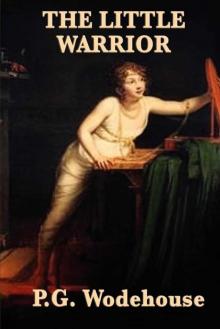 The Little Warrior
The Little Warrior Ice in the Bedroom
Ice in the Bedroom Leave It to Psmith
Leave It to Psmith Thank You, Jeeves:
Thank You, Jeeves: Money in the Bank
Money in the Bank The Man Upstairs and Other Stories
The Man Upstairs and Other Stories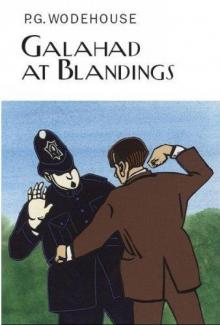 Galahad at Blandings
Galahad at Blandings The Jeeves Omnibus Vol. 5
The Jeeves Omnibus Vol. 5 Uncle Dynamite
Uncle Dynamite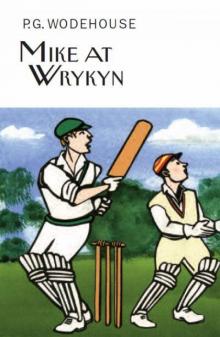 Mike at Wrykyn
Mike at Wrykyn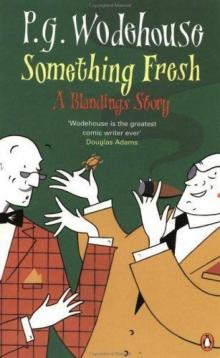 Something Fresh
Something Fresh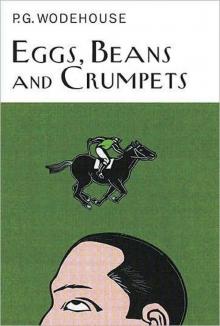 Eggs, Beans and Crumpets
Eggs, Beans and Crumpets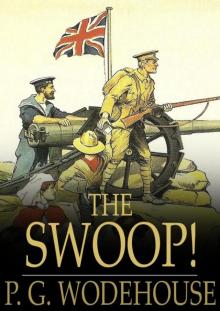 The Swoop: How Clarence Saved England (Forgotten Books)
The Swoop: How Clarence Saved England (Forgotten Books)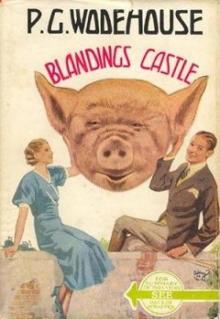 Blanding Castle Omnibus
Blanding Castle Omnibus Wodehouse at the Wicket: A Cricketing Anthology
Wodehouse at the Wicket: A Cricketing Anthology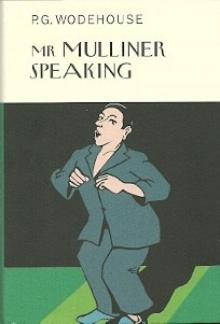 Mr. Mulliner Speaking
Mr. Mulliner Speaking Hot Water
Hot Water The Jeeves Omnibus - Vol 3: The Mating Season / Ring for Jeeves / Very Good, Jeeves
The Jeeves Omnibus - Vol 3: The Mating Season / Ring for Jeeves / Very Good, Jeeves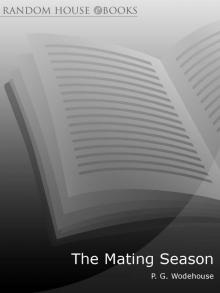 The Mating Season
The Mating Season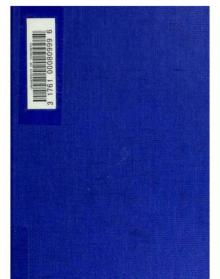 Meet Mr. Mulliner
Meet Mr. Mulliner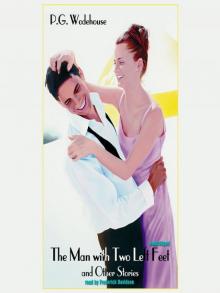 The Man with Two Left Feet, and Other Stories
The Man with Two Left Feet, and Other Stories Not George Washington — an Autobiographical Novel
Not George Washington — an Autobiographical Novel Young Men in Spats
Young Men in Spats The Jeeves Omnibus Vol. 4
The Jeeves Omnibus Vol. 4 A Pelican at Blandings:
A Pelican at Blandings: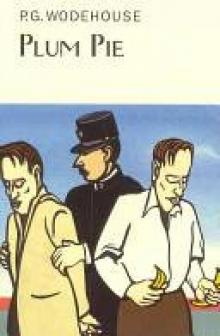 Plum Pie
Plum Pie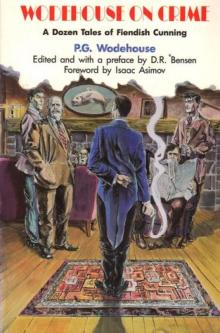 Wodehouse On Crime
Wodehouse On Crime The Jeeves Omnibus Vol. 2: Right Ho, Jeeves / Joy in the Morning / Carry On, Jeeves
The Jeeves Omnibus Vol. 2: Right Ho, Jeeves / Joy in the Morning / Carry On, Jeeves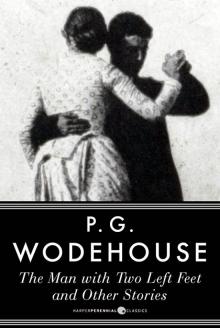 The Man With Two Left Feet
The Man With Two Left Feet Full Moon:
Full Moon: Jeeves and the Feudal Spirit:
Jeeves and the Feudal Spirit: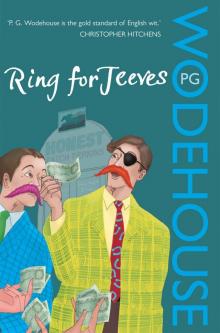 Ring For Jeeves
Ring For Jeeves Something New
Something New The Girl on the Boat
The Girl on the Boat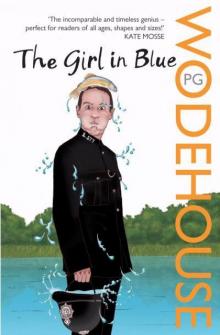 The Girl in Blue
The Girl in Blue Pigs Have Wings:
Pigs Have Wings: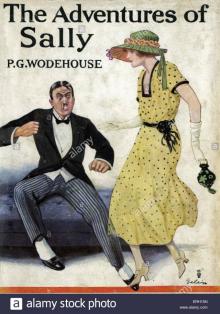 The Adventures of Sally
The Adventures of Sally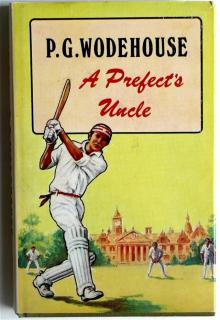 A Prefect's Uncle
A Prefect's Uncle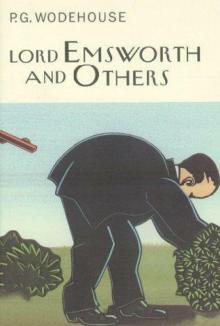 Lord Emsworth and Others
Lord Emsworth and Others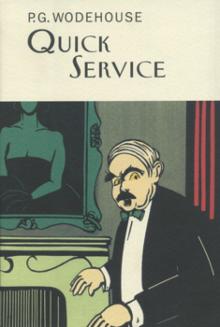 Quick Service
Quick Service The Prince and Betty
The Prince and Betty The Gem Collector
The Gem Collector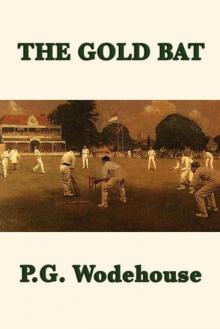 The Gold Bat
The Gold Bat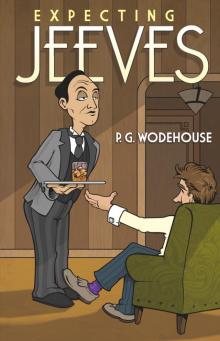 Expecting Jeeves
Expecting Jeeves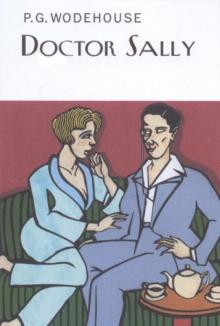 Doctor Sally
Doctor Sally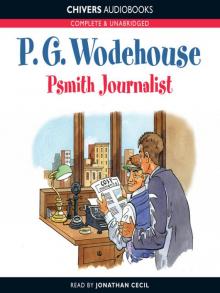 Psmith, Journalist
Psmith, Journalist The Golf Omnibus
The Golf Omnibus Heavy Weather
Heavy Weather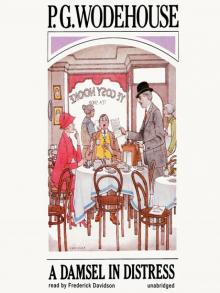 A Damsel in Distress
A Damsel in Distress The Coming of Bill
The Coming of Bill Summer Lightning
Summer Lightning Piccadilly Jim
Piccadilly Jim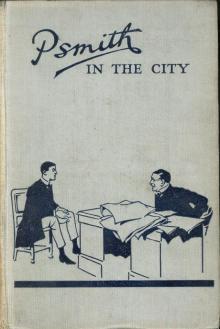 Psmith in the City
Psmith in the City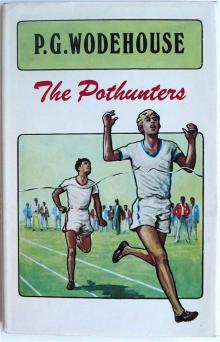 The Pothunters
The Pothunters Service With a Smile
Service With a Smile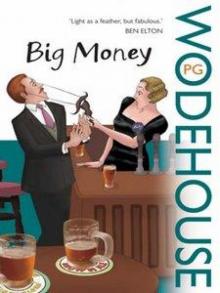 Big Money
Big Money Three Men and a Maid
Three Men and a Maid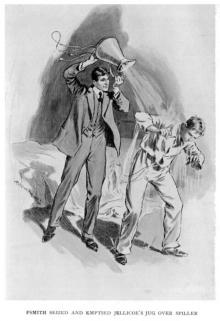 Mike and Psmith
Mike and Psmith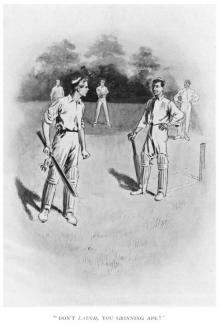 Mike
Mike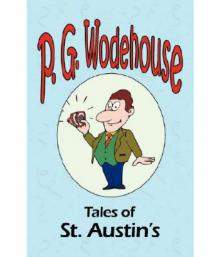 Tales of St. Austin's
Tales of St. Austin's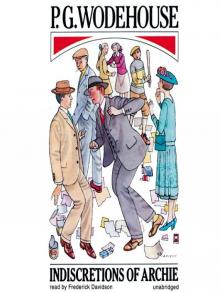 Indiscretions of Archie
Indiscretions of Archie Pigs Have Wings
Pigs Have Wings The Jeeves Omnibus - Vol 4: (Jeeves & Wooster): No.4
The Jeeves Omnibus - Vol 4: (Jeeves & Wooster): No.4 The White Feather
The White Feather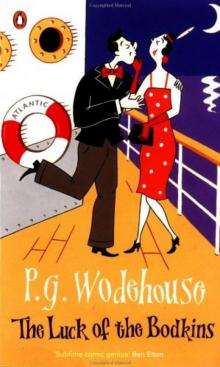 Luck of the Bodkins
Luck of the Bodkins THE SPRING SUIT
THE SPRING SUIT Full Moon
Full Moon Very Good, Jeeves
Very Good, Jeeves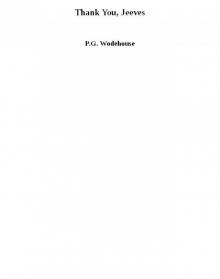 Thank You, Jeeves
Thank You, Jeeves Reginald's Record Knock.
Reginald's Record Knock. Wodehouse At the Wicket
Wodehouse At the Wicket LADIES AND GENTLEMEN V. PLAYERS
LADIES AND GENTLEMEN V. PLAYERS The Jeeves Omnibus - Vol 5: (Jeeves & Wooster)
The Jeeves Omnibus - Vol 5: (Jeeves & Wooster) The Jeeves Omnibus - Vol 1: (Jeeves & Wooster): No.1
The Jeeves Omnibus - Vol 1: (Jeeves & Wooster): No.1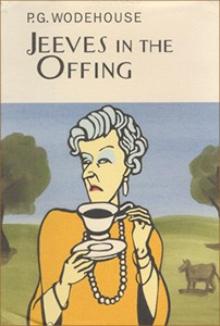 Jeeves in the offing jaw-12
Jeeves in the offing jaw-12